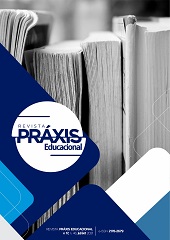"Being a chemistry teacher is": perceptions about teaching and its social role
DOI:
https://doi.org/10.22481/praxisedu.v17i46.8653Keywords:
Chemical Education, Teacher Training, Being a teacher isAbstract
The dialogical interface between the university and the Basic Education schools is a privileged investigative space-time for teacher training. It is in this inter-relational field that the necessary fusion between the constructs of academic knowledge and the school universe takes place, as it is in the contact between peers that undergraduate students identify and recognize themselves as teaching professionals. In light of the above, in this article we present the results of a research on Being a Chemistry teacher carried out with seven students from a degree course at a Bahian university. The investigated group answered the question about Being a Chemistry teacher, providing their justifications. The listed expressions were submitted to the WordClouds Web application, to create the word cloud, showing the most expressive evocations. The result obtained evidenced the terms Knowledge, Teaching, Science and Autonomy. According to Bardin, we carried out a content analysis of the justifications for all the terms listed by the licensors, emerging the categories Science and Society, Physical Environment and Professionalization. From the results found, we can conclude that this group perceives the importance of the pedagogical training carried out in the exchange between the
Downloads
Metrics
References
ALBINO, Ângela. Currículo e autonomia docente: enunciações políticas. Curitiba: Appris, 2018.
AZEVEDO, Maicon; SELLES, Sandra; LIMA-TAVARES, Daniele. Relações entre os movimentos reformistas educacionais do ensino de ciências nos Estados Unidos e Brasil na década de 1960. Educ. foco, v. 21 n. 1, p. 237-257 mar. 2016 / jun. 2016.
BARDIN, Laurence. Análise de conteúdo. Lisboa: Edições 70, 2011.
BRASIL. Ministério da Educação. Base Nacional Comum Curricular: Educação é a base. Brasília: MEC/CNE. 2018.
BRASIL. Conselho Nacional de Educação. Base Nacional Comum para a Formação Inicial e Continuada de Professores da Educação Básica. MEC/CNE. 2020.
CARVALHO, A. M. P.; GIL-PÉREZ, D. Formação de professores de Ciências: tendências e inovações. 10. ed., São Paulo: Cortez, 2011.
BOGDAN, Robert; BIKLEN, Sari Knopp. Investigação Qualitativa em Educação: uma introdução à teoria e aos métodos. Portugal: Porto, 1994.
DUBAR, Claude. A Construção de si pela atividade de trabalho: a socialização profissional. Cadernos de Pesquisa. v.42 n.146 p.351-367 maio/ago. 2012.
DUBAR, Claude. A crise das identidades: a interpretação de uma mutação. São Paulo: Editora da Universidade de São Paulo, 2009.
DUTRA-PEREIRA, Franklin Kaic. Aventuras do contar(se): narrativas da formação de professores de química à distância. Orientador: Carlos Neco da Silva Júnior. 2019. 198 f. Tese (Doutorado em Ensino de Ciências e Educação Matemática) – Universidade Federal do Rio Grande do Norte, Natal, 2019.
FREIRE, Paulo. Pedagogia da autonomia: saberes necessários à prática educativa. São Paulo: Paz e Terra, 2011.
MALDANER, Otavio Aloisio. A pós-graduação e a formação do educador químico. In: ROSA, Maria Inês Petrucci.; ROSSI, Adriano Vitorino. (orgs). Educação Química no Brasil: memórias, políticas e tendências. 2. ed. Campinas: Editora Átomo, 2012. p. 269-288. 294p.
MALDANER, Otávio Aloisio. A formação inicial e continuada de professores de química professor/pesquisador. Ijuí: Ed. UNIJUÍ, 2000. (Coleção educação em química).
PIMENTA, Selma G. Formação de professores: identidade e saberes da docência. In: PIMENTA, S. G.(Org.). Saberes pedagógicos e atividade docente. 8. ed., São Paulo: Cortez, 2012, p. 19-26.
RIBEIRO, M. E. M.; SPECHT, C. C.; PONTALTI, L. C.; RAMOS, M. G. A contribuição do PIBID na formação de novos professores de Química. REDEQUIM, Recife, Matinhos, v. 2, n. 1, p. 102-106, 2016.
RODRIGUES, Larissa Zancan; PEREIRA, Beatriz; MOHR, Adriana. O Documento “Proposta para Base Nacional Comum da Formação de Professores da Educação Básica” (BNCFP): Dez Razões para Temer e Contestar a BNCFP. Revista Brasileira de Pesquisa em Educação em Ciências. RBPEC 20, 1–39, 2019.
ROSA, Maria Inês Petrucci; OLIVEIRA, Ana Carolina Garcia de; PAVAN, Adriana Cristina; CORRADI, Dulcelena Peralis. Formação de professores de Química na perspectiva da cultura: reflexões sobre a noção de identidade profissional. In: ROSA, Maria Inês Petrucci; ROSSI, Adriana Vitorino (orgs). Educação Química no Brasil: memórias, políticas e tendências. 2 ed. Campinas: Átomo, 2012. p. 146-159. 294p.
ROSA, Maria Inês Petrucci. Investigação e Ensino: articulações e possibilidades na formação de professores de Ciências. Ijuí: Editora UNIJUÍ, 2004.
TARDIF, Maurice. Saberes docentes e formação profissional. 11 ed. Petrópolis: Vozes, 2014.
Downloads
Published
How to Cite
Issue
Section
License
Copyright (c) 2021 Práxis Educacional

This work is licensed under a Creative Commons Attribution-ShareAlike 4.0 International License.
You are free to:
Share - copy and redistribute the material in any medium or format; Adapt - remix, transform, and build from the material for any purpose, even commercially. This license is acceptable for Free Cultural Works. The licensor cannot revoke these freedoms as long as you follow the terms of the license.
Under the following terms:
Attribution - You must appropriately give credit, provide a link to the license, and indicate if any changes have been made. You may do so in any reasonable way, but not in a way that suggests that you or your use is endorsed by the licensor.
There are no additional restrictions - You cannot apply legal terms or technological measures that legally restrict others to make any use permitted by the license.










